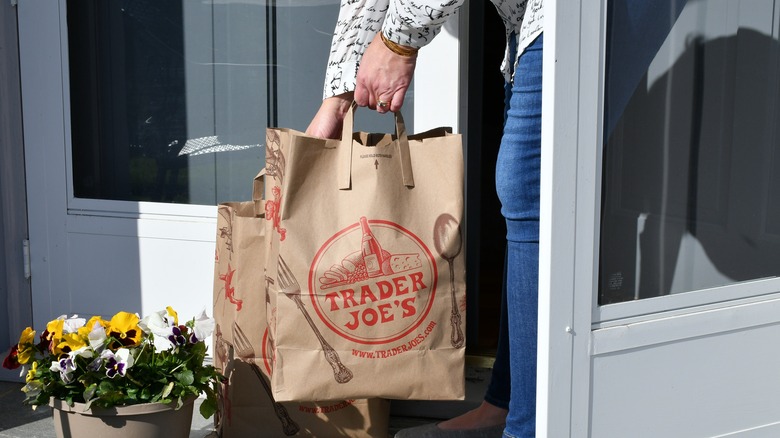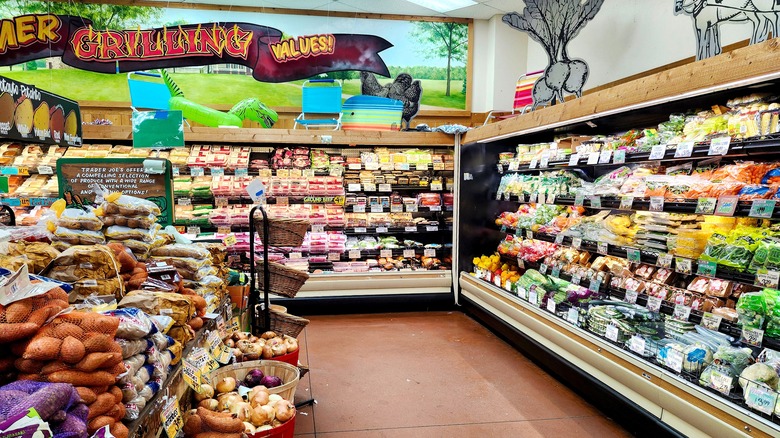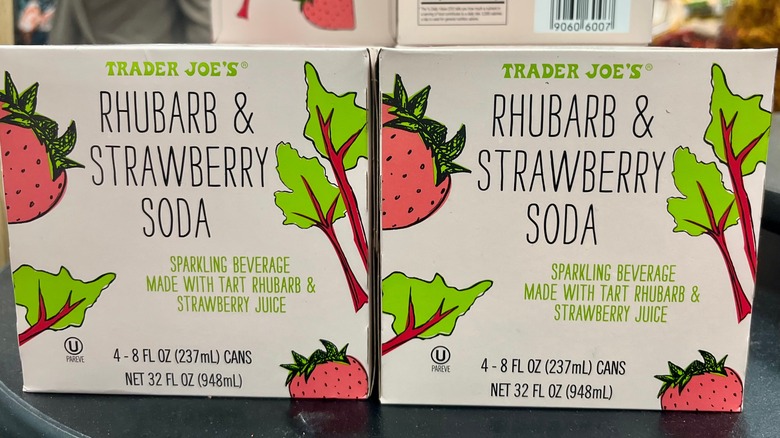The Reason Trader Joe's Rarely Sells Name Brand Products
Perhaps most well-known as the home of Everything But the Bagel Seasoning, Trader Joe's has a storied reputation as the retailer to frequent when looking for inexpensive 19-cent bananas, delicious carrot-ginger bisque, or ube ice cream. With its laid-back tiki-style culture, selection of high-quality grocery staples, and unique products unavailable anywhere else, it's no wonder Trader Joe's is something of a cultural phenomenon. However, the secret to the company's success lies not in complicated marketing schemes but in confidence in its own brand.
The last time you were in a Trader Joe's, which brands did you see on the shelves? If you noted the distinct lack of Kraft, Mars, and Pepsi products, it's because Trader Joe's simply doesn't sell them. Rather than paying top-dollar to stock name brands, Trader Joe's invested in its very own private label. Back in 1977 — around the time its focus shifted to food — this was a very risky move. At that time, private labels were mainly viewed as a way for stores to compete with national brands by offering lower-quality, less expensive versions of popular items.
Trader Joe's, however, broke the mold by seeking out unusual, artisanal, and health-conscious products to place under its label. Instead of offering a version of what everyone else had, it offered customers products available nowhere else.
Trader Joe's — offering higher-quality products for less
Trader Joe's strategy not only involves favoring their store label over national brands, it also eschews traditional marketing practices. Rather than sinking funds into expensive marketing campaigns, celebrity endorsements, and product placement, it relies on minimal marketing and recommendations from happy customers. That's why everything about Trader Joe's — from the laid-back atmosphere to the lack of self-checkouts — is curated to help customers feel relaxed and engaged.
Though this clever marketing strategy results in significant cost-savings, Trader Joe's uses a variety of strategies to save money. For instance, its stores are significantly smaller, with less diverse product selection than competitors. Giant superstores that sell millions of products are extremely expensive to stock and maintain. By maintaining smaller spaces stocked with just a few thousand products, Trader Joe's keeps its overhead low while providing a small-town shopping experience.
Reduced overhead and advertising expenses mean Trader Joe's can allocate more revenue to its products, enabling it to create a reputation for carrying high-quality foods. Additionally, since there's no need to recoup marketing or advertising expenses, the company can also sell its products at a lower price point. This benefits the customers, who provide positive word-of-mouth marketing, which increases Trader Joe's customer base.
The reason behind Trader Joe's unconventional product selection
From mocha latte candy-coated pretzels to yuzu miso paste and kung pao Brussels sprouts, Trader Joe's certainly has a lock on oddball items. By nestling these interesting selections among more expected products on its shelves, Trader Joe's encourages customers to linger and explore. Limited-time seasonal items like honey-roasted pumpkin ravioli also draw more people to the stores, producing greater volume sales despite its lower per-item pricing.
Piquing customers' interest is just one reason Trader Joe's invests in unusual products. In the 1970s, when the company was developing its private label, it decided quality over quantity would be one way to stand out from the crowd.
In a 2023 episode of the podcast "In Case You Missed It," Trader Joe's VP of marketing Matt Sloan and marketing director Tara Miller briefly discussed what products never make it to the shelves, including artificial colors, flavors, and MSG. Until very recently, these additives were extremely hard to avoid in shelf-stable products. That meant Trader Joe's had to explore options and vendors outside the mainstream to stock its shelves. This creativity and determination paid off in the form of the varied and unique product selection that defines Trader Joe's today.


